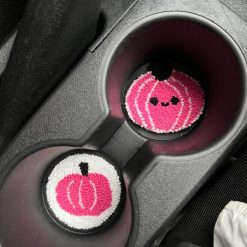In recent years, the growing awareness about environmental issues has significantly influenced consumer choices. As people become more conscious of the environmental impact of their purchases, many are turning to sustainable, eco-friendly alternatives to mass-produced goods. Handmade products, especially those used for crafting, have risen in popularity for their unique designs and eco-conscious benefits.
This article will explore the eco-friendly advantages of choosing handmade products, focusing on how they can enhance your craft projects while reducing your environmental footprint.
-
Reduced Environmental Impact of Production
Handmade products, especially those made in small batches, generally have a lower environmental impact than mass-produced items. By working with artisans who use fewer resources, you’re contributing to a more sustainable process. Many handmade crafts, like felt hearts, are created without the use of energy-consuming machinery, further minimizing their environmental footprint. -
Ethically Sourced and Sustainable Materials
One of the key eco-friendly benefits of handmade products is the use of sustainable and ethically sourced materials. For example, felt hearts for Valentine’s Day decorations may be made from 100% wool or other natural fibers. These materials are biodegradable and come from sources that support sustainable farming or production practices, reducing environmental harm compared to synthetic materials. -
Less Waste and Overproduction
Handmade businesses are typically much smaller than mass manufacturers, producing only what is needed or made to order. This leads to significantly less waste and fewer excess products ending up in landfills. In crafting, leftover materials like wool or felt are often repurposed for future projects, ensuring nothing goes to waste. -
Lower Carbon Footprint
Handmade products usually have a shorter supply chain, especially if they are produced locally. By purchasing handmade felt hearts for your DIY projects, you’re supporting local artisans and reducing the carbon emissions associated with long-distance transportation and mass production. This means a much lower carbon footprint for each item. -
Eco-Friendly Packaging
Many handmade artisans focus on reducing packaging waste. For example, your felt heart decorations may be shipped in eco-friendly packaging such as recycled paper or biodegradable bags. By supporting such businesses, you’re encouraging the use of sustainable packaging that contributes to a circular economy. -
Support for Local and Sustainable Economies
Purchasing handmade products, such as felt hearts, not only benefits the environment but also supports local artisans and their communities. Many crafters use local materials and contribute back to their local economies, further reinforcing sustainable practices. By buying handmade, you’re making a positive impact on both the environment and the artisans’ livelihoods. -
Longer Lifespan and Durability
Handmade items tend to be more durable and higher in quality than mass-produced goods. A handmade felt heart can last for years, reducing the need for frequent replacements and helping to avoid overconsumption. Investing in high-quality, sustainable products ensures that your crafts will stand the test of time. -
Personal and Emotional Value
Handmade products often hold sentimental value because they carry a personal connection to the artisan who created them. The attention to detail and the craftsmanship behind these items make them more meaningful, encouraging you to cherish and care for them. This emotional attachment helps ensure that these items don’t end up in landfills, contributing to a more sustainable lifestyle.
Conclusion
Choosing handmade products for your craft projects, like the beautiful felt hearts for Valentine’s Day or other celebrations, brings numerous eco-friendly benefits. From reducing environmental impact and using sustainable materials to supporting local artisans and fostering a circular economy, handmade goods are a perfect choice for those who care about sustainability. By supporting handmade, you not only enhance your craft projects but also contribute to a greener, more sustainable future.

 Handmade Pink Halloween Car Coasters – Set of 2 Spooky Pumpkin and Ghost Punch Needle Designs for Festive Fall Decor
Handmade Pink Halloween Car Coasters – Set of 2 Spooky Pumpkin and Ghost Punch Needle Designs for Festive Fall Decor